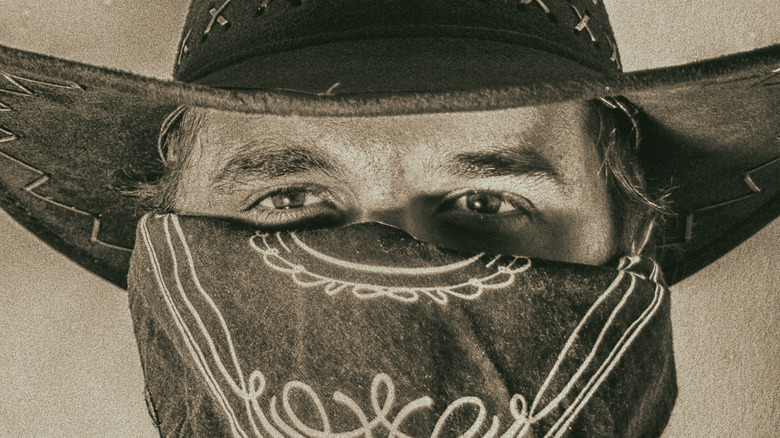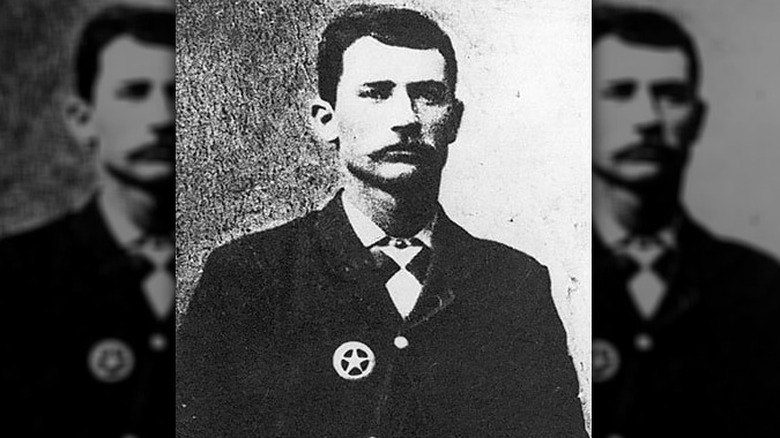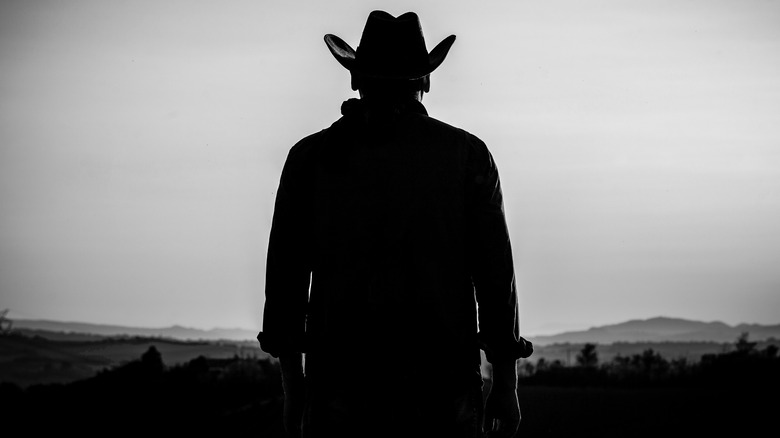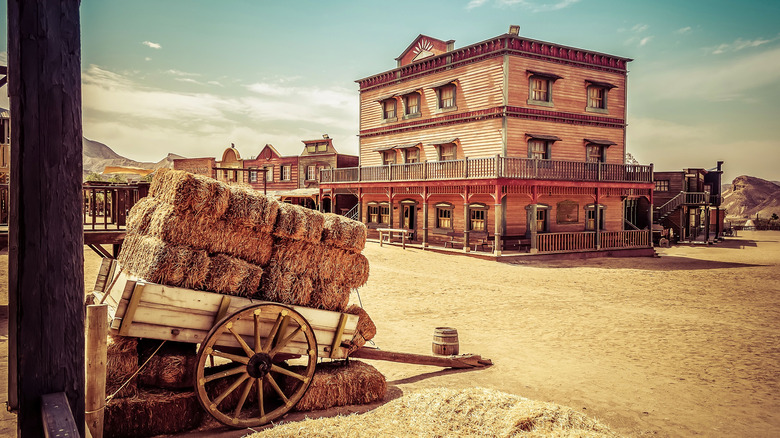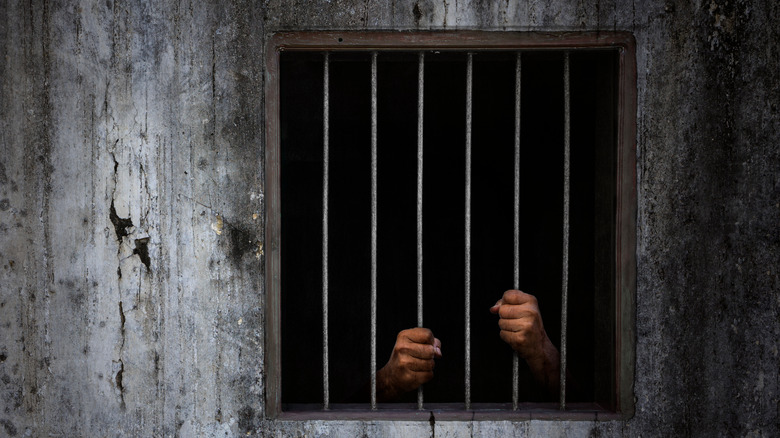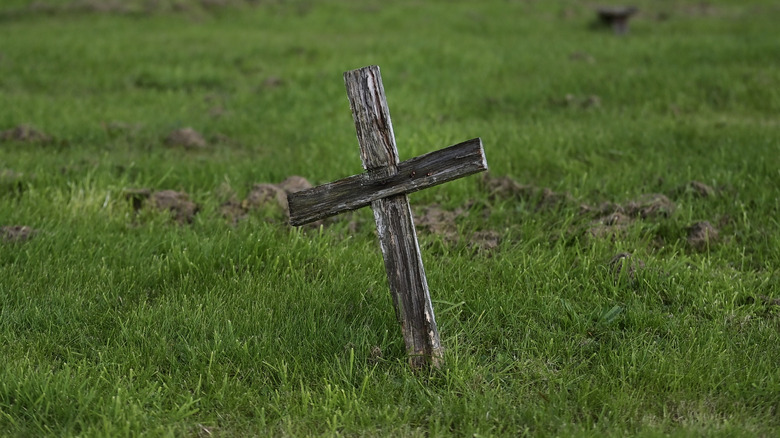The Untold Truth Of Outlaw Henry Newton Brown
Henry Newton Brown, who would become both a lawman and an outlaw, was born in Phelps County Missouri in 1857. When he and his sister were orphaned when they were children, they were sent to live with their aunt and uncle, Aldamira and Jasper. As reported by Home Brewed Mojo, Brown lived on his aunt and uncle's farm outside Rolla until he turned 17 years old.
At the age of 17, Brown traveled west, like many other young men his age. He initially settled in eastern Colorado, where he found work as a cowboy and a buffalo hunter. As reported by Legends of America, Brown worked on a number of ranches throughout Colorado before moving south to Texas.
Upon arrival in Texas, Brown continued working as a cowboy. However, as reported by Home Brewed Mojo, he fled to the New Mexico Territory after an argument with another man turned deadly. Although little is known about the circumstances surrounding the incident, Brown was accused of shooting the other man three times in the chest.
As reported by The Outlaw Marshal, Brown arrived in New Mexico in 1876. He initially worked for L.G. Murphy & Company. However, he left the firm 18 months later amid a dispute about pay. Brown was then hired by John Chisum to work on his South Spring Ranch as a cowboy, but Chisum eventually sent Brown to John Tunstall's Rio Feliz ranch, where he was tasked with serving as a bodyguard for Tunstall and his associates.
Henry Newton Brown teamed up with Billy the Kid
As reported by Home Brewed Mojo, L.G. Murphy & Company was an organization referred to as "The House," and Tunstall was part of an opposing organization called the "Tunstall-McSween Faction." Henry Newton Brown, Billy the Kid, and a number of others, supported the Tunstall-McSween Faction and vowed to protect them against The House.
Tensions between the two organizations continued to escalate, as Tunstall reportedly owed money to "The House," which sought to seize some of Tunstall's horses to settle the debt. As reported by Legends of America, Tunstall refused to surrender the animals. Despite the presence of several bodyguards, he was shot in the head and killed amid the ensuing argument.
Legends of America reports Tunstall's murder was rumored to have been ordered by James Dolan and Lawrence Murphy, and was committed by deputy William Morton. With plans to exact revenge for the murder, Brown and Billy the Kid joined a group of men who called themselves the Regulators.
On March 6, 1878, the Regulators found and detained Morton and several of his associates. Although they initially planned to transport the men back to Lincoln, Home Brew Mojo reports Morton and his men were shot to death along the way. In addition to Billy the Kid, Brown was accused of having "his gun out and firing" in the assault that sparked what came to be known as "The Battle of Lincoln."
Outlaw Henry Newton Brown became a lawman
As he was facing murder charges once again, Brown fled to Tascosa, Texas, where he was hired as a cowboy for George Littlefield. On his way to Texas, Brown rode with Billy the Kid and his gang and became adept at rustling cattle and horses. However, when he arrived in Tascosa, he built a reputation for hunting down rustlers. As reported by Home Brewed Mojo, his success at finding and returning livestock to their rightful owners eventually led to his appointment as deputy sheriff of Oldham County.
Although his methods were effective, Home Brewed Mojo reports Brown left "many busted skulls" in his wake. As reported by Legends of America, he was also accused of "picking fights with drunks," and was subsequently relieved of his appointment. According to Home Brewed Mojo, Brown briefly returned to George Littlefield's ranch. However, he was eventually let go, as he was accused of being too aggressive with the other ranch hands.
Brown left Texas and moved to Woods County, Oklahoma, where he was again hired to work on a large ranch. However, when he heard rumors about the death of a city marshal in Caldwell Kansas, Brown left the ranch in hopes of taking the deceased lawman's place. Home Brewed Mojo reports Caldwell was known as a "wild" town, which had trouble finding and keeping lawmen. Brown believed he was up to the task, and was appointed city marshal of Caldwell in 1882.
Henry Newton Brown became a respected city marshal
Shortly thereafter, he appointed his old friend outlaw Ben Robertson, who was also known as Ben Wheeler, as his deputy. Within months, Home Brewed Mojo reports, Brown shot and killed a Native American named Spotted Horse, who had reportedly been "causing trouble." He also shot and killed a gambler named Newt Boyce. Although Brown had a reputation for being unnecessarily aggressive, the residents of Caldwell, Kansas, were appreciative of his efforts to reduce the city's crime rate. As reported by Legends of America, the Caldwell Post praised Brown as being "one of the quickest men on the trigger in the Southwest." Another local paper, the Caldwell Commercial, said Brown was "cool, courageous and gentlemanly, and free from vices." Home Brewed Mojo reports the townspeople gifted him with an engraved Winchester rifle, which said, "Presented to City Marshal H. N. Brown For Valuable Service rendered on behalf of the Citizens of Caldwell Kas A. N. Colson Mayor Dec 1882."
By early 1884, Brown had purchased a home and married a local woman. Legends of America reports that by all appearances, the former outlaw had changed his ways and was settling down as a successful marshal and a devoted husband. However, Brown's "debts were mounting," as he did not make enough money to support his lifestyle. Shortly after he was married, Brown, his deputy Ben Wheeler, and two other outlaws planned the robbery of a bank in Medicine Lodge, Kansas.
Henry Newton Brown returned to his old ways
On April 30, 1884, the four men walked into the bank and confronted bank president E.W. Payne. Instead of cooperating, Payne attempted to grab Brown's gun. As reported by Legends of America, Brown responded by shooting the bank president dead. The men also shot the bank's chief cashier, George Geppert. Although the wound was fatal, Geppert managed to close and lock the bank's vault before he died. As they could not get inside the vault, the outlaws left the bank empty-handed.
The attempted robbery, and shooting, drew attention from several townspeople, who chased Brown and his associates out of town. Legends of America reports the outlaws made it to a box canyon, where they exchanged gunfire with the angry mob for two hours. Brown and his cohorts eventually realized they were outnumbered and surrendered. Brown, Wheeler, and their two accomplices were taken back to Medicine Lodge, where they were placed in the city jail. As reported by Legends of America, the officers took photos of the men, provided them with a meal, then instructed them to write farewell letters to their families. Home Brewed Mojo relates that Brown wrote to his wife, asking for forgiveness. However, he denied shooting or killing anyone. He also asked her to keep the Winchester he received as a gift from the townspeople.
Henry Newton Brown was killed trying to escape
While the would-be bank robbers were inside the jail, the townspeople had formed an even larger mob, and stood outside shouting, "Hang them." Despite the fact that they wrote their farewell letters, the outlaws planned to escape, as their leg irons were "improperly placed around the men's boots."
At 9 p.m., three shots were fired, signaling the beginning of the planned lynching. However, as reported by Home Brewed Mojo, Brown and Wheeler managed to escape their shackles and came running out the doors of the building in which they were being held. Although the outlaws attempted to run down the street and out of town, they did not make it very far. A local farmer named Billy Kelley shot Brown to death at close range with his shotgun, "almost tearing Brown in two." Brown was 27 years old. Wheeler was also shot by the townspeople, but was not fatally wounded. He and the other two accomplices were hanged. In her memoir, Brown's wife, Alice, only mentioned him in passing, saying that she was married in 1884 and her husband "passed away years ago."
